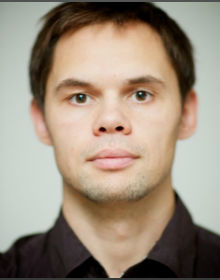 Menu
Menu
Dr Dmitry Isakov
Researcher
Dr Dmitry Isakov is an experimental scientist with a multidisciplinary programme of research, focused on the study of dielectric, piezoelectric, ferroelectric, linear optical and nonlinear optical properties in bulk, thin films and low dimensional nano structures. Dr. Dmitry Isakov was granted his doctorate in May 2003 from the Institute of Crystallography of the Russian Academy of Sciences, for studies of ferroelectric switching processes in strontium–barium niobate. After graduation, he maintained an independent interest in the study of perovskite relaxor ferroelectrics, which resulted in the development of a unique technique for the study of polarization switching by the optical scattering method. This work was done in a short postdoctoral fellowship at the University of Osnabruek and was awarded with a Shubnikov Prize in 2004.
In the Autumn of 2005, Dr. Isakov moved to the University of Minho, where he became engaged in organic-inorganic hybrid polar structures, with a view to their importance for electro-optical and piezoelectrical applications. Between 2008 and 2014, Dr. Isakov was a Research Assistant Professor in the Centre of Physics at the University of Minho. Over the past 5 years, his research has been devoted to the fabrication and characterization of scaffolds from customized polymer-based functional nanomaterials, for potential use as functional units in molecular electronics, energy harvesting systems and integrated optics. The nanomanufacturing process consists of mixing functional materials with a polymer precursor solution, followed by producing nanofibers using electrospinning. In his research work on nanofibers, several important results have been achieved: a multifunctional electro-mechanical and pyroelectrical nanogenerator (with microenergy harvester potential for applications in self-powered wearable electronics), based on the direct deposition of ferroelectric nanofibres on a flexible substrate; an array of nanofibres with a giant nonlinear optical response; nanofibres with piezoelectric bioactive amino acids (such as glycine and alanines) have all been produced and demonstrated. This work has given some impetus to the emerging field of research in polar biocompatible materials for multifunctional applications in implantable nanoelectronics.
Dmitry became a member of the QUEST project in the Manufacture of Graded Materials for Novel Electromagnetic Applications in April 2014.

